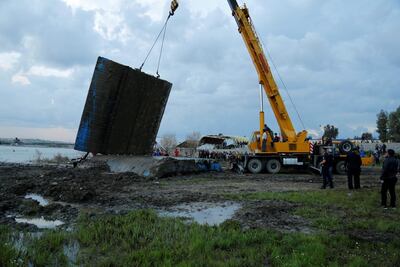Iraqi Prime Minister Adel Abdul Mahdi has formed a crisis council led by a prominent academic to administer Nineveh province after the dismissal of its governor on Sunday.
Dr Muzahim Al Khayat, president of Nineveh University, will chair the council of operations chiefs and police commanders until the provincial council elects a new governor.
The former governor, Nofal Al Agub, was sacked by Parliament after the sinking of a ferry in Mosul, the provincial capital, in which nearly 100 people died.
The boat was loaded to five times its capacity with people celebrating the Kurdish new year when it capsized on the Tigris River on Thursday.
Police said 97 people were killed, 67 remain missing and 55 were rescued.

Parliament declared those killed in the tragedy were martyrs, allowing their families to receive financial compensation and pave the way for court proceedings against those responsible.
Residents were relieved to hear of Dr Al Khayat's appointment, said Ali Al Baroodi, a lecturer at the University of Mosul.
"Dr Muzahim Al Khayat is a prominent surgeon and figure in the province," Mr Al Baroodi told The National.
He said the academic was “very respected and appreciated”.
Mr Abdul Mahdi has asked the council to investigate and hold people responsible for the ferry sinking to account.
Residents say the tragedy was symptomatic of mismanagement and corruption in Nineveh.
New tragedy warning
Iraq’s independent High Commission for Human Rights said on Monday that the province faced the risk of more tragedies as people continued to use bridges that were damaged in heavy fighting to liberate the province from ISIS.
“The total number of bridges in the Nineveh is 59 but during the occupation of ISIS, 36 were damaged as a result of terrorist activities and shelling,” said Ali Al Bayati, a member of the commission.
Four of the damaged bridges have been not been repaired.
“These bridges are working and carrying vehicles, and there is a risk of accidents and the loss of life,” Mr Al Bayati said.
He said the commission had asked the government to “intervene urgently and repair such important infrastructure in Iraqi cities to avoid civilian losses”.
Reconstruction in Mosul has been slow since Iraqi forces retook the city in late 2017.
A bridge across the Tigris River collapsed last week during flooding caused by heavy rain, just days after it was repaired and reopened.
Citizens were given no warning against using the bridge after it collapsed, the commission said.


